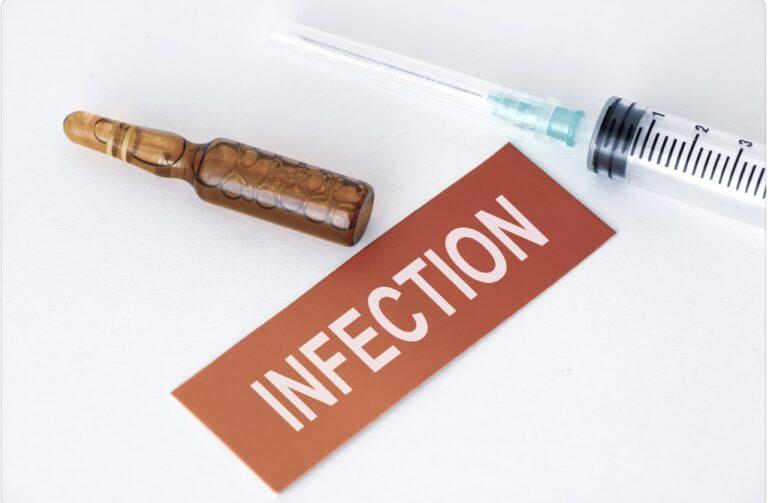Respiratory infections occur when pathogens, such as bacteria and viruses affect various parts of our breathing system, from the sinuses and throat to the lungs and airways. Among these, upper respiratory tract infections (URTIs) are particularly common. In this article, we will delve into upper respiratory tract infections, their causes, symptoms, diagnosis, and effective management strategies.
What is an upper respiratory tract infection?
An upper respiratory tract infection, or URTI, is a condition that affects the upper portion of the respiratory system, including the sinuses, throat, tonsils, larynx, pharynx and nasal passages. These infections are typically caused by viruses, with the common cold being one of the most well-known examples. While URTIs are often considered minor ailments, they can still have a significant impact on an individual’s overall health and well-being.
Causes of upper respiratory tract infections
The primary cause of upper respiratory tract infections are viruses entering the upper respiratory system. These viruses can be transmitted through:
- Direct contact: Touching surfaces or objects contaminated with secretions of the virus and then touching your eyes, nose, or mouth can lead to infection
- Respiratory droplets: Sneezing, coughing, or even speaking can spray virus-laden droplets into the air, which others can then inhale
- Poor hygiene: Failing to wash your hands regularly or properly can increase the risk of spreading and contracting the virus
Certain risk factors can also make individuals more susceptible to developing upper respiratory tract infections, including:
- Age: Children, particularly those in daycare or school, are at a higher risk due to their developing immune systems and frequent exposure to germs
- Weakened immune system: Individuals with underlying health conditions, such as heart or lung problems, or those with compromised immune systems are more vulnerable to URTIs
- Seasonal variations: Certain types of upper respiratory infections, like the common cold, tend to be more common during specific times of the year, such as the colder months
Symptoms of upper respiratory tract infections
The symptoms of upper respiratory tract infections can vary in severity and duration, but they often include:
- Stuffy or runny nose (nasal discharge): Excess mucus and nasal congestion are common symptoms
- Sore throat: The inflammation of the throat can cause discomfort and difficulty swallowing
- Cough: A persistent cough is a common symptom of upper respiratory tract infections, often accompanied by the production of phlegm or mucus
- Fever: A mild to moderate fever is a common sign of an upper respiratory infection, although not everyone will have signs of a fever
- Headache: Inflammation and pressure in the sinuses can lead to headaches
- Fatigue and malaise: Feeling generally unwell, lacking energy and decreased appetite
The severity and duration of symptoms can vary depending on the cause of the infection and the individual’s overall health.
Diagnosing upper respiratory tract infections
Healthcare providers can diagnose an upper respiratory tract infection based on a physical examination and the reported symptoms. They may also perform additional tests, such as:
- Nasal or throat swab: Collecting a sample from the nose or throat to test for the presence of specific viruses or bacteria
- Chest X-ray: Imaging the chest to rule out the presence of a lower respiratory infection, such as pneumonia
- Lung function tests: Evaluating lung function to determine the extent of the infection
These tests can help differentiate between viral and bacterial infections, which can guide the treatment approach.
Treatment and management of upper respiratory tract infections
Most upper respiratory tract infections are caused by viruses and will resolve on their own within one to two weeks. In these cases, the main focus of treatment is to reduce the symptoms and support the body’s natural healing process. Some common treatment options include:
- Getting plenty of rest and staying hydrated by drinking water, tea, or broth, can help the body’s immune system fight off the infection
- Over-the-counter (OTC) medications such as pain relievers, decongestants, antihistamine/decongestant combinations and cough suppressants can provide temporary relief
- Gargling with warm salt water can help soothe a sore throat and reduce inflammation
- Herbal or natural remedies, such as honey, ginger, or echinacea, can help to alleviate URTI symptoms
Healthcare providers may prescribe antibiotics to treat the underlying cause of the infection where a bacterial infection is present, such as strep throat.
Complications of upper respiratory tract infections
In some cases, URTIs can lead to more serious complications, such as:
- Sinusitis: Inflammation and infection of the sinuses, leading to persistent sinus pain, headaches, and difficulty breathing
- Pharyngitis: Also known as a sore throat. It’s usually caused by a virus but sometimes group A Streptococcus bacteria
- Laryngitis: An inflammation of your larynx or voice box
- Ear Infections: Causing pain, hearing loss, and potential complications
- Bronchitis: The inflammation of the bronchial tubes, leading to a persistent cough and difficulty breathing
- Pneumonia: A serious lung infection
It’s important to seek medical attention promptly to prevent the development of these complications, if you experience any concerning symptoms.
Preventing upper respiratory tract infections
While it’s not possible to completely prevent upper respiratory tract infections, there are several steps you can take to reduce your risk:
- Proper handwashing: Regularly washing your hands with soap and water, especially before eating or touching your face
- Covering coughs and sneezes: Using a tissue or the inside of your elbow to cover your mouth and nose when coughing or sneezing to prevent the spread of respiratory droplets
- Avoiding close contact with sick individuals
- Maintaining a healthy lifestyle: Getting enough sleep, eating a balanced diet, drinking plenty of fluids and engaging in regular physical activity can help strengthen your immune system
- Vaccination: Certain vaccines can help prevent specific types of upper respiratory tract infections and reduce the severity of symptoms
By implementing these preventive measures, you can take steps to safeguard your health and minimise the impact of upper respiratory tract infections.
Distinguishing upper respiratory tract infections from other respiratory conditions
While upper respiratory tract infections share some similarities with other respiratory conditions, there are distinct differences that can help differentiate them:
- Influenza: The flu affects the entire body, often with more severe symptoms like high fever, body aches, and fatigue, in addition to upper respiratory symptoms
- Pneumonia: Pneumonia is a lower respiratory tract infection causing symptoms like chest pain, difficulty breathing, and a productive cough
- Bronchitis: Bronchitis is an inflammation of the bronchial tubes, leading to a persistent cough and the production of mucus or phlegm
Recognising the characteristics of each condition can help you get the most appropriate medical care and treatment.
When to seek medical attention
While most upper respiratory tract infections are self-limited and can be managed at home, there are times when it’s important to seek medical attention:
- If your symptoms last longer than two weeks or worsen over time
- Shortness of breath, rapid breathing, or wheezing may be a sign of a more serious underlying condition
- A fever higher than 103°F (39.4°C) may indicate a more severe infection
- Individuals with weakened immune systems, such as those with chronic medical conditions or undergoing cancer treatment
By seeking professional medical care, you can ensure that any underlying issues are addressed to prevent the development of potentially serious complications.
The role of antibiotics in upper respiratory tract infections
The majority of upper respiratory tract infections are caused by viruses, which do not respond to antibiotics. Antibiotics are only prescribed for bacterial infections, such as strep throat or certain sinus infections.
Overuse or inappropriate antibiotic use can lead to the development of antibiotic-resistant bacteria, which can make future infections more difficult to treat. Healthcare providers will evaluate the cause of your infection and only prescribe antibiotics when they are deemed necessary and appropriate.
In cases where antibiotics are not indicated, treatment will be on managing the symptoms and allowing the body’s natural immune response to clear the viral infection.
The impact of upper respiratory tract infections on children
Upper respiratory tract infections are particularly common in children, who are at high risk due to their developing immune systems and frequent exposure to germs in social settings like daycare or school.
Children may experience a higher frequency of URTIs, with estimates suggesting they can have up to six respiratory illnesses per year. While these infections are generally not serious, they can still have an impact on a child’s well-being, causing discomfort, disrupting their daily activities, and leading to missed school days.
Parents and caregivers need to be vigilant in monitoring their child’s symptoms and seeking medical attention if the infection persists or worsens. Additionally, teaching children proper hygiene practices, such as regular handwashing and covering coughs and sneezes, can help reduce the risk of contracting and spreading upper respiratory tract infections.
The role of vaccination in preventing upper respiratory tract infections
Certain vaccines can play a critical role in reducing the risk and severity of some of the most common and serious respiratory infections.
The flu vaccine can help protect against specific strains of the influenza virus, which can cause severe respiratory symptoms and complications. Additionally, the pneumococcal vaccine can help prevent pneumonia, a potentially serious complication of an upper respiratory tract infection.
Vaccinations may be recommend for individuals at a higher risk of developing complications from respiratory infections, such as the elderly, those with chronic medical conditions, or those with weakened immune systems.
Conclusion
Upper respiratory tract infections are a widespread and often unavoidable part of our lives, but with a better understanding of their causes, symptoms, and management strategies, we can take steps to reduce their impact on our lives.
By practicing good hygiene, seeking prompt medical attention when necessary, and incorporating preventive measures like vaccination, we can equip ourselves against the challenges posed by upper respiratory tract infections.
Sources
- Upper Respiratory Infection: Symptoms, Contagious, Treatment
- Respiratory tract infections (RTIs) – NHS
Medical Disclaimer
NowPatient has taken all reasonable steps to ensure that all material is factually accurate, complete, and current. However, the knowledge and experience of a qualified healthcare professional should always be sought after instead of using the information on this page. Before taking any drug, you should always speak to your doctor or another qualified healthcare provider.
The information provided here about medications is subject to change and is not meant to include all uses, precautions, warnings, directions, drug interactions, allergic reactions, or negative effects. The absence of warnings or other information for a particular medication does not imply that the medication or medication combination is appropriate for all patients or for all possible purposes.








